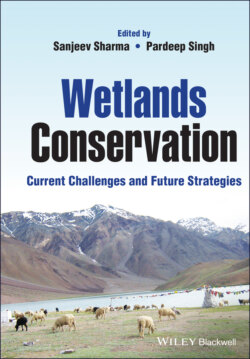Читать книгу Wetlands Conservation - Группа авторов - Страница 18
1.4.1 Conservation Measures and Future Strategies
ОглавлениеHuman activities have had a different effect on the wetland environment and in the hydrological cycle, and an impact on wetlands themselves. Prioritization for recognising the environmental implications of wetland management activities is crucial. Development of holistic approaches and strategies to maximise the protection and conservation of the wetland ecosystem is essential to maintain the ecological balance and regulating earth system. Wetland management project plans need to be incorporated into economic development planning and with a socio‐cultural and location‐specific priority—establishing a sound ecosystem through the combination of land use planning and economic development. Local community participation in the implementation of management practises and priority needs to be given to the indigenous knowledge framework for the conservation of the wetland Ecosystem. Regular monitoring and scientific studies to determine the importance of wetlands contribute to quantifying ecological, economic and social values. It can be beneficial to ensure successful conservation and restoration.
Ramsar Convention focused on wetlands, recognizing their significance, particularly as waterfowl habitats (Matthews 1993). On realizing their worth, people and governments started laying stress on the conservation of the wetlands. An unusual spurt of interest in wetlands was seen at all levels among scholars, technical and management persons, researchers working in the field of society and economics, different social organisations, and Governments. The Ramsar Convention has been instrumental and highly successful in mobilizing most nations to pledge for wetland conservation. The Convention also talked about the wise and optimum use of wetlands and not the conservation only (Ramsar Convention Bureau 1998, 2001 2018). The signatories have to formulate laws that ensure the conservation of listed wetlands and the optimum use of wetlands in their domain.
The participation of local stakeholders, in particular the communities, is an important determinant of the effectiveness of conservation initiatives. The Ramsar Convention on Wetlands defines participatory management as a learning mechanism that seeks to enhance the collective analysis and action ability of all those interested in wetland conservation. Maintaining and preserving wetlands that are inclusive has a far greater chance of success. The Ramsar Convention indicates that local people should be encouraged to appreciate the principles of wetlands as champions of wetland protection and wise use and should also be involved in inappropriate policy formulation, planning and management.
Implementation of a performance appraisal accountability system among the stakeholders directly and indirectly involved in the wetlands conservation programme. Legal action needs to be taken against those who are responsible for wetlands degradation. Good governance and implementation of wetlands conservation legislation and law at the national and global level can improve the wetland ecosystem's health. Capacity building programme including creating a reliable institutional mechanism for imparting training to wetlands handlers, policymakers, and other key stakeholders. Developing conservation framework and modules in online and offline mode, creating groups of wetlands managers for collaborative research and knowledge are important tools and approaches for conserving wetlands and mitigating the adverse impacts on the wetland ecosystem. Education and awareness are the most crucial components for the successful conservation of wetlands.
